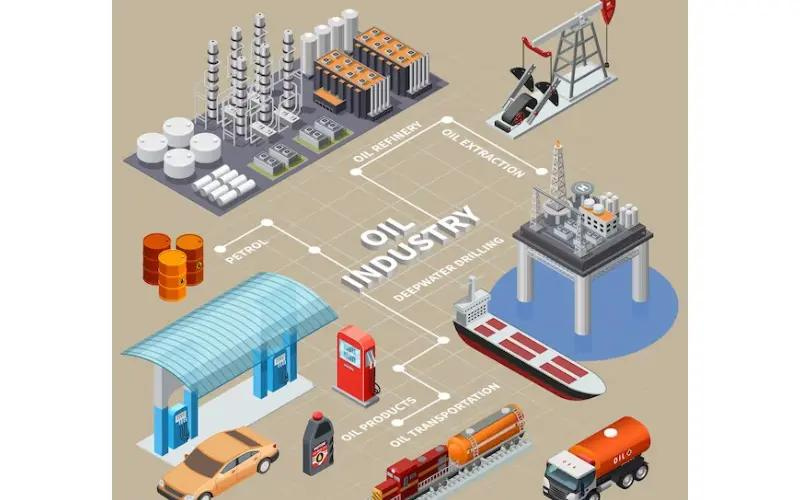[TOC]

RFID Technology for Oil & Gas
RFID (Radio Frequency Identification) technology is revolutionizing the Oil & Gas sector, offering advanced solutions for real-time tracking and data management. This technology enables automatic and continuous monitoring of equipment and materials, which is essential for improving efficiency and ensuring safety in operations.
If you want to learn more about this technology, we invite you to visit our informative page, where you will find a detailed explanation of how it works.
In the context of the Oil & Gas sector, RFID stands out as a critical tool for resource management and safety. Its use allows tracking of critical components, tools, and personnel, optimizing workflows and preventing accidents through proactive monitoring of equipment conditions. The introduction of this technology has significantly reduced downtime and improved operational efficiency, while also facilitating compliance with strict safety regulations.
The Importance of RFID in the Oil & Gas Sector
In the Oil & Gas sector, where efficient resource management and safety are top priorities, RFID proves to be an indispensable tool. This technology enables automatic and real-time monitoring of equipment and materials, providing full visibility over every aspect of operations. The ability to track critical components, tools, and even personnel not only optimizes workflows but also helps prevent accidents, ensuring compliance with the strictest safety regulations.
The introduction of RFID in the Oil & Gas sector has led to significant improvements in:
Reduction of Downtime: Minimizing delays caused by the absence or search for essential equipment.
Increased Safety: Proactively monitoring the condition of equipment to prevent potentially hazardous failures.
Improved Operational Efficiency: Automating inventory control and resource management.
Reduction of Downtime: Minimizing delays caused by the absence or search for essential equipment.
Increased Safety: Proactively monitoring the condition of equipment to prevent potentially hazardous failures.
Improved Operational Efficiency: Automating inventory control and resource management.
With the growing adoption of this technology in the industry, it becomes crucial for companies to not only understand the benefits of RFID but also explore how to best implement it to suit the specific needs of the Oil & Gas sector.
Applications of RFID in the Oil & Gas Sector
The adoption of RFID technology in the Oil & Gas sector offers several practical applications that can significantly improve daily operations. This section illustrates how RFID is used to manage resources, improve maintenance and safety, optimize inventory control, and support regulatory compliance.
Resource Management
Tracking equipment, materials, and human resources through RFID enhances visibility and control on a large scale. In an environment where assets frequently move between different locations and operating conditions, RFID allows for precise, real-time localization. This helps prevent the loss of expensive equipment and reduces downtime caused by the lack of necessary tools, ultimately improving overall productivity.
Maintenance and Safety
RFID can be employed to monitor the condition of facilities and equipment. By attaching RFID tags to critical assets, companies can receive real-time data on wear and tear, as well as maintenance needs. This proactive monitoring not only helps prevent sudden breakdowns but also ensures operator safety, significantly reducing the risk of serious accidents.
Inventory Control
The use of RFID for inventory management enables accurate monitoring of consumables and other stock. With RFID systems, companies can automate the recording of incoming and outgoing materials, minimizing counting errors and reducing waste. This accuracy is especially beneficial for controlling high-value or hazardous stock, where precision is critical for operational safety.
Compliance and Regulation
Compliance with safety and environmental regulations is a critical aspect of the Oil & Gas sector. RFID helps ensure that all activities are documented and traceable, facilitating regulatory compliance. Data collected through RFID technology can be used to demonstrate compliance during inspections and to improve operational practices in line with regulatory standards.
Case Studies
The implementation of RFID technology in the Oil & Gas sector has already shown tangible improvements in various companies. The case studies presented here illustrate the effectiveness of RFID in enhancing operations, safety, and resource management in complex and challenging environments.
Case 1: Optimizing Resource Management
At one of the leading oil companies, the introduction of RFID technology revolutionized the way they manage equipment and personnel at a large oil field. Before the adoption of RFID, the company relied on manual methods for tracking resources, often leading to errors and delays. After introducing RFID tags on equipment and workwear, they saw significant improvements in tracking accuracy and a reduction in wasted time.
Case 2: Improving Maintenance and Safety
Another key application of RFID has been in the preventive maintenance of equipment. A drilling services company adopted RFID tags to monitor the condition of its heavy machinery. The connected RFID sensors allowed for early detection of wear or malfunctions, enabling timely interventions before problems escalated into costly or safety-threatening failures.
Case 3: Efficient Inventory Control
A refinery implemented RFID systems to manage its stock of critical chemical materials. Thanks to RFID tags, stock management became more precise, avoiding overproduction or shortages that could disrupt production. This system also improved safety by ensuring that hazardous materials were always stored and handled properly.
These case studies demonstrate how RFID technology can be adapted to various aspects of the Oil & Gas sector to improve operational efficiency, increase safety, and reduce costs. The lessons learned from these experiences provide valuable insights into how companies can implement and benefit from RFID in their day-to-day operations.
The Future of RFID Technology in the Oil & Gas Sector
RFID technology continues to evolve rapidly, and the Oil & Gas sector is no exception. In the future, we can expect several developments that will make RFID even more indispensable:
Technological Innovations
Technological innovations are leading to increasingly advanced RFID tags with greater data storage capacity and better performance in extreme environments. New materials and designs will allow tags to withstand even harsher conditions, expanding the possibilities for application.
Integration with IoT
The integration of RFID with the Internet of Things (IoT) represents another significant leap forward. This combination will allow the creation of intelligent networks of devices that communicate with each other, providing real-time data on a wide range of operational parameters. This improvement will lead to even more efficient resource management and the ability to respond immediately to anomalies.
Data Analysis and Artificial Intelligence
The combined use of RFID with advanced data analysis and artificial intelligence (AI) will open new frontiers for predictive management and preventive maintenance. Companies will be able to analyze large amounts of data collected by RFID tags to identify patterns and predict problems before they occur, improving both safety and operational efficiency.
Sustainability and Regulation
With increasing pressure for more sustainable operations and the need for compliance with ever-stricter regulations, RFID will play a crucial role in environmental monitoring and resource management. Companies will be able to track and manage emissions, energy consumption, and the use of natural resources more efficiently.
Conclusions
RFID technology has already proven its value in the Oil & Gas sector, providing effective solutions for tracking resources, maintenance, and safety. With technological innovations and the integration of other advanced technologies such as IoT and artificial intelligence, the future of RFID in the sector promises further improvements in efficiency, safety, and sustainability.
Implementing RFID is not just about improving daily operations but also represents a strategic investment for the future. Companies that adopt this technology can expect not only immediate returns in terms of operational efficiency but also a long-term competitive advantage in an increasingly demanding global market.
If you would like more information on how RFID technology can be implemented in your operating environment or are interested in recommended RFID products, do not hesitate to contact us. We are here to help you navigate and take full advantage of this innovative technology.







